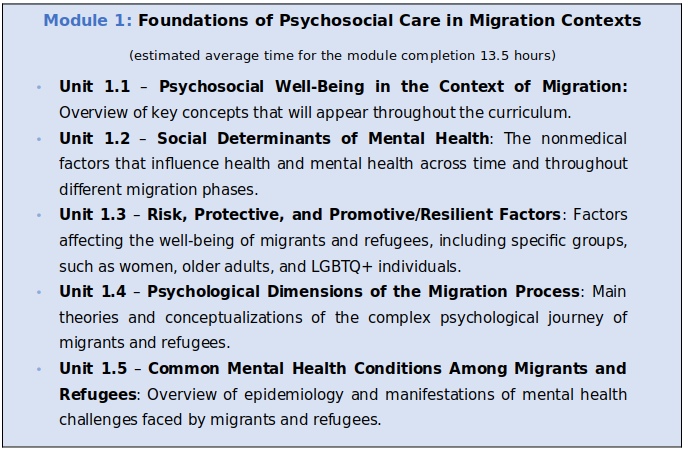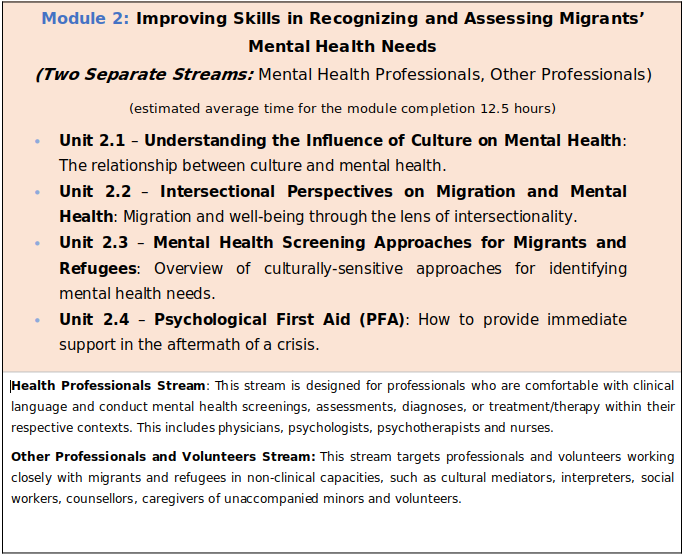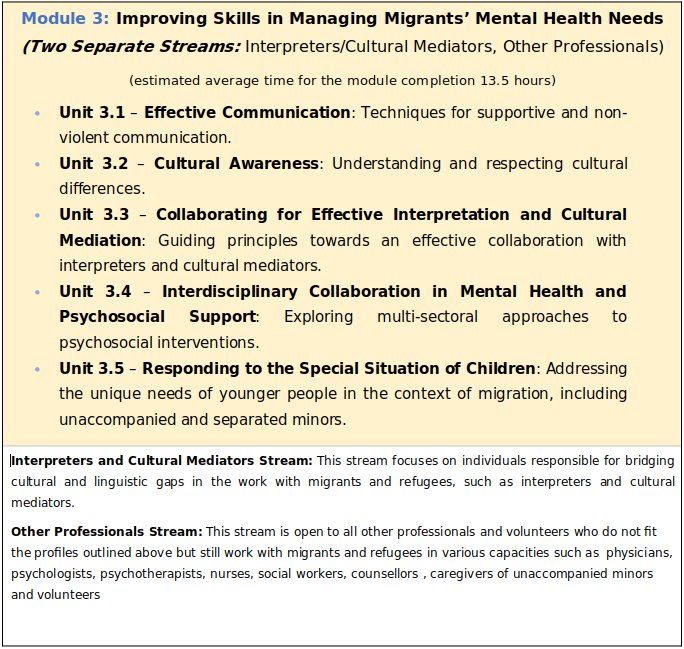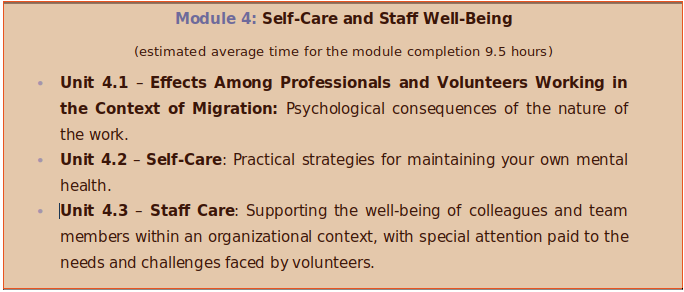EU-MiCare
Understanding the Migrant Condition
Migration is not merely the crossing of borders; it is a profound upheaval that disrupts identity, community, and the sense of home. People migrate for various reasons – some seeking better opportunities, others fleeing conflict or persecution. Each journey is unique, and the experiences of migrants and refugees upon arrival in a new country vary widely. The migration process typically unfolds across three overlapping stages: pre-migration, migration, and post-migration, each influencing mental health in distinct ways. Vulnerable groups, such as women, children, older adults, and LGBTQ+ individuals, encounter compounded challenges during their journey.
Adjusting to a new culture, or acculturation, can be a significant stressor, heightened by experiences of xenophobia, racism, and the pressure to assimilate. Often, being identified primarily as a migrant can further complicate integration, leaving individuals struggling to find a sense of belonging. Despite these challenges, many migrants and refugees exhibit remarkable resilience, demonstrating a wide spectrum of responses and often thriving despite adversity.
Particularly as it relates to poor mental health outcomes, it is increasingly recognized that the development of mental health disorders among migrants arises from a combination of factors, including life stories, current circumstances, social support, access to care, and integration policies. Effectively addressing these issues requires a comprehensive approach that goes beyond merely providing psychological or protection services, integrating other critical components of psychosocial care. This involves implementing measures and developing multidisciplinary, multi-level psychosocial interventions that consider the broader social and systemic determinants impacting well-being.
For refugees in particular, a central aspect of these experiences is the involuntary loss of home, a common thread for all who have been displaced due to various upheavals. Though they may not always express it clearly, the search for a new home often lies at the heart of their journey. The role of field workers is to accompany them in this process, offering support as they navigate this difficult transition. This requires stepping outside one’s comfort zone and engaging genuinely with those being served, acknowledging their full humanity and unique experiences.
The Synergic Therapeutic Complexity Approach
This training draws on the Synergic Therapeutic Complexity approach developed by Renos Papadopoulos (2021), which emphasizes three core principles:
- Complexity: Recognizing that the experience of migrants and refugees is shaped by the interplay between individuals, those who assist them, and the broader sociopolitical context. This also involves considering the diverse range of responses (whether negative, neutral, or positive) that people exhibit in response to the adversities they face.
- Uniqueness: Understanding that each migrant and refugee’s experience is distinct and continuously evolving.
- Totality: Seeing beyond the status/label of ‘migrant’ or ‘refugee’ to honor people’s full humanity while recognizing them as active agents of change in their own lives.
As professionals and volunteers involved in the care of people who have fled their homelands, the role is not only to alleviate suffering but also to advocate for greater openness and humanity in addressing the issues they are faced with. This entails approaching people with compassion without overemphasizing pathologization or medicalization and ensuring that psychosocial support remains a dignified and respectful response to their needs. The synergic approach also calls for field workers to reflect on biases and assumptions, recognizing how societal narratives and professional practices may inadvertently perpetuate stereotypes or reduce individuals to oversimplified categories.
Course Objectives and Outcomes
The EU-MiCare e-learning course invites professionals and volunteers to embrace a human-centered, psychosocial framework for engaging with migrants and refugees. Through a combination of theoretical grounding, experiential exercises, reflective activities, and practical frameworks such as the Adversity Grid, the Ulysses Scale, and the Wheel of Privilege and Power, this course aims to help participants identify and respond to the diverse impacts of migration and drive meaningful change in their work.
Participants will gain:
- Knowledge: A deeper understanding of the psychosocial dimensions of migration, including the unique challenges faced by migrants and refugees across different stages of their journey.
- Skills: Practical tools to deliver compassionate, effective support while moving beyond trauma-centered approaches to recognize and address the full spectrum of responses to adversity.
- Attitudes: A reflective, culturally attuned perspective that embraces the complexity, uniqueness, and totality of everyone’s experience.
- Connections: Opportunities to engage with a network of service providers and experts from all over Europe, fostering collaboration and shared learning in migrant and refugee mental health.
Course Target Groups
The primary target groups of the course include:
- Health professionals (e.g., psychologists, social workers, physicians, nurses) and other practitioners (e.g., cultural mediators, interpreters, counselors, caregivers of unaccompanied minors) working with migrant and refugee populations in settings across Europe such as reception camps, non-profit organizations, public mental health centers, hospitals, and shelters.
- Vocational Education and Training (VET) providers, VET developers, and academic institutions, who will further use and promote the training.
- Relevant professional associations, public sector bodies, and civil society organizations involved in migrant and refugee health.
Course Structure
The curriculum content has been developed using participatory methodologies, incorporating the input of field workers throughout the training design process. Additionally, the perspectives of migrants and refugees (adults, families, and children) have been indirectly represented through the expertise of partner organizations providing mental health and social care services to these populations. The course follows a logical progression from general to specific topics and is comprised of 4 modules and a total of 17 units, with detailed descriptions provided below. Modules 2 and 3 are offered in two separate streams to cater to different professional roles.




Although an average estimated time frame is provided for the reading duration of each module, completion times may vary. Therefore, participants are encouraged to assess the time required for each unit and pace themselves accordingly. The modules consist of readings, videos, multimedia resources, and interactive learning activities.
Assessment and Certificate of Completion
The assessment will be made through a series of assessment questions and four vignettes, each corresponding to one of the course modules. These vignettes are based on real-life stories from the field, addressing diverse scenarios that professionals and volunteers might encounter in their work with migrant and refugee populations.
Upon completion of all post-module assessment questions, participants will be eligible to receive a certificate of completion.
Learning Tools and Resources
- Theoretical Foundations: Each unit includes a detailed literature review and references, drawing from current global research on migrant and refugee care.
- Reflective Exercises: Practical activities designed to deepen understanding and enhance skills in addressing migrant and refugee mental health.
- Glossary: A comprehensive resource in the Repository providing definitions of key migration terms, available in English.
- Supplementary Materials: Additional tools, including videos, graphics, and other helpful resources, accessible through the Repository (English language only).
- Community of Knowledge: A dedicated, independently operated forum connecting learners across Europe to exchange ideas, share insights, network, and build a community of practice.
eLearning Icons and Visual Indicators
![]()
In Closing…
Migration is a journey marked by complexity and profound change. Those who support migrants and refugees play a vital role in helping individuals and communities toward rebuilding a sense of home and belonging. By the end of the course, participants will be better prepared to address the needs of migrants and refugees with competence and cultural humility, contributing to improved outcomes in their work.
Download course introduction (pdf format)
Course Introduction - English version
Introduzione al corso - Italian version
Εισαγωγή στο Πρόγραμμα Κατάρτισης - Greek version
Introducción al curso - Spanish version
Einführung - German version